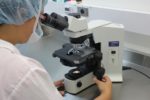
Corticosteroid and DMARD use may increase skin cancer risk in rheumatoid arthritis
 People with rheumatoid arthritis seem to be at increased risk for non-melanoma skin cancer, particularly when treated with higher cumulative doses of corticosteroids and methotrexate, as well as more types of disease-modifying anti-rheumatic drugs, according to research in Clinical and Experimental Rheumatology.
People with rheumatoid arthritis seem to be at increased risk for non-melanoma skin cancer, particularly when treated with higher cumulative doses of corticosteroids and methotrexate, as well as more types of disease-modifying anti-rheumatic drugs, according to research in Clinical and Experimental Rheumatology.
The association was reported in people treated with cyclosporine, d-penicillamine and etanercept too, and was stronger in older people.
Experts investigated the influence of corticosteroids and disease-modifying anti-rheumatic drugs (DMARDs, including conventional synthetic and biologic DMARDs) treatment on the association between rheumatoid arthritis and non-melanoma skin cancer.
Data from a health database in Taiwan matched nearly 20,000 people with non-melanoma skin cancer with people without the cancer.
People with rheumatoid arthritis had a significantly higher association with non-melanoma skin cancer compared with those without rheumatoid arthritis. That association was particularly evident in people with rheumatoid arthritis who were on cyclosporine, etanercept and d-penicillamine. These effects were strengthened in people aged 65 years and older.
The association between rheumatoid arthritis and non-melanoma skin cancer was also particularly significant in people treated with cumulative doses of more than 10g of corticosteroids and more than 3g of methotrexate, particularly so in those aged over 65 years.
For more in-depth features, interviews and information, subscribe to Arthritis Digest magazine, a popular title that’s published six times a year. Click here for the digital version or tel 0845 643 8470 to order your had copy. You’ll know what your doctor is talking about, what new drugs are in the pipeline and be up to date on helpful products.
